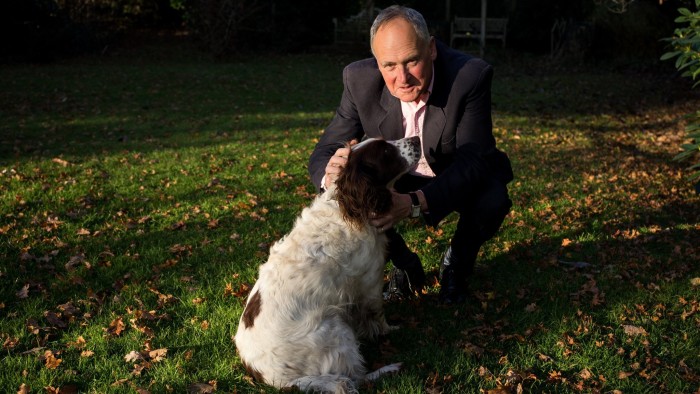The ‘unretired’: coming back to work in droves
Roula Khalaf, Editor of the FT, selects her favourite stories in this weekly newsletter.

Eighteen months ago, Tom Harvey retired. Then this year he changed his mind and unretired. He is far from alone. In the UK, according to research in Aging & Society, 25 per cent of retirees return to work, about half of these within five years of retirement.
It defined unretirement as “reporting being retired and subsequently recommencing paid employment, or beginning full-time work following partial retirement (working fewer than 30 hours per week)”. A 2010 study found that rates were similar in the US.
Such research suggests that retirement may no longer be a permanent state. Instead, it is a process.
For Mr Harvey, his retirement a few years before the UK state pension age of 65 was highly desirable after four decades in corporate life — first in advertising, then financial services communication. It gave him a chance to walk his dogs and ride horses. But his brain craved stimulation. “You do miss the intellectual engagement of work and the debate around difficult issues,” he says.
The financial aspect is also important. “It would be nice to have more dosh.”
Today, the 63-year-old is offering consultancy to small businesses, particularly helping to mentor directors and senior managers on communications.
His reaction reflects that of others, says Loretta Platts of the Stress Research Institute at Stockholm University and a co-author of the report. “Some people have a retirement shock. This isn’t what they thought [it would be].”
The study defined retirement as people saying their main activity was “retired”. Ms Platts says that others may disagree, and may fix on an age, perhaps after 65. But in her view “analysing the data in this way means that many, [or even] most retirement transitions are actually missed”.
In the UK, the proportion of 50 to 64-year-olds in work has climbed to about 71 per cent from 60 per cent since 2000, according to the Office for National Statistics, while the number of people working beyond 65 has doubled to about 10 per cent.
In the US the Bureau of Labor Statistics predicts that for the period up to 2024, both the 65-74 age group and those aged 75-plus will have faster rates of labour force growth annually than any other age groups. In response to the additional costs of living longer, many governments are increasing the age at which people can receive state pensions.
For Robert Roy, who is based in Washington, retirement at 69 had been attractive because he was “finished with what I was doing. It was intense.” His career in social work with children and families had been rewarding. But after his last job as chief executive of a non-profit organisation working in family services in Portland, he also felt in need of a break.
After stepping down, Mr Roy devoted time to fishing and writing. But he felt “something was missing. I thought, ‘what is my purpose in life?’” Work had been diverting. “You went to work, your day was defined. You remove that, all of a sudden, what did you replace with it? What’s next? What do I do?”
So Mr Roy unretired. He had always felt uncomfortable with the term “retired” because it was like he “was done. I didn’t feel that way. I didn’t want to feel like I was finished.” Today, he works two days a week at the Virginia Garcia Memorial Health Center in mental health services and is a consultant to non-profit organisations that provide treatment for troubled children and their families. This suits the 79-year-old, as it means he can spend time with his family.
He made the shift thanks to an Encore Fellowship, a scheme run by a US not-for-profit organisation that helps experienced professionals, typically in their 50s or 60s, who want to move to a career in public service.
Encore helps to plug a training gap. A paper published in the Public Policy and Ageing Report (2015) argued that retaining older workers will mean increasing training and development opportunities for those in their 50s. The current lack of development for older workers is in part due to the attitudes of line managers and employers. Individuals may also feel “after a certain age or stage in their career, that further training is unnecessary. Or . . . that the type of training and learning they are likely to receive is inappropriate given their level of skill and experience.”
A report published this week by Business in the Community urged employers to do more to train older workers and prepare them for the digital economy. David Sinclair, director of the International Longevity Centre UK, has said the stereotype about older workers is that they are reliable: “It feeds an image that they are safe and steady, when in fact people innovate across their entire lives.”
For Mr Harvey and Mr Roy, retirement was attractive because they wanted a break from the demands of the job. “It is a shame that organisations aren’t more sophisticated about identifying stress,” observes Mr Harvey. He suggests they could help employees who may “need to walk away from the coalface and take a few months out”. Developments such as home working and flexitime are also promising, he adds.
Lynda Gratton, a professor of management practice at London Business School and co-author of The 100-Year Life, has said that employers should let people work as long as they can. But they should be more creative about career paths. Employees will want to “hop out at times. They’ll want to rejuvenate. They’ll want to learn a new skill.” She also believes workers need to plan their long working lives better.

Ms Platts thinks this switch from employment to retirement and then back again is a reflection of employers’ short-sightedness. Too many fail to retain their employees in the first place by not finding them flexible roles.
“It does matter because older people have more difficulty getting jobs. The longer that you have gaps, the harder it is to get back into work.”
Mr Harvey says it is not easy to find a job: “Turning up with grey hair and specs, people are often quite apprehensive about working with someone 20 years senior. Age prejudice exists.”
This has not been the case for Jacky Beare, who retired at 55 from Marks and Spencer in 2015, having worked as a commercial manager. This year she returned on contract as a sales assistant. She works five days a week from 11am to 3pm. She has stayed in the working world and retained her marketable skills.
And a new reason for returning is being cited by some of the UK’s “unretired” — Brexit uncertainty was a factor in her decision, Ms Beare says. “I’m OK now, but might not be.”
Comments